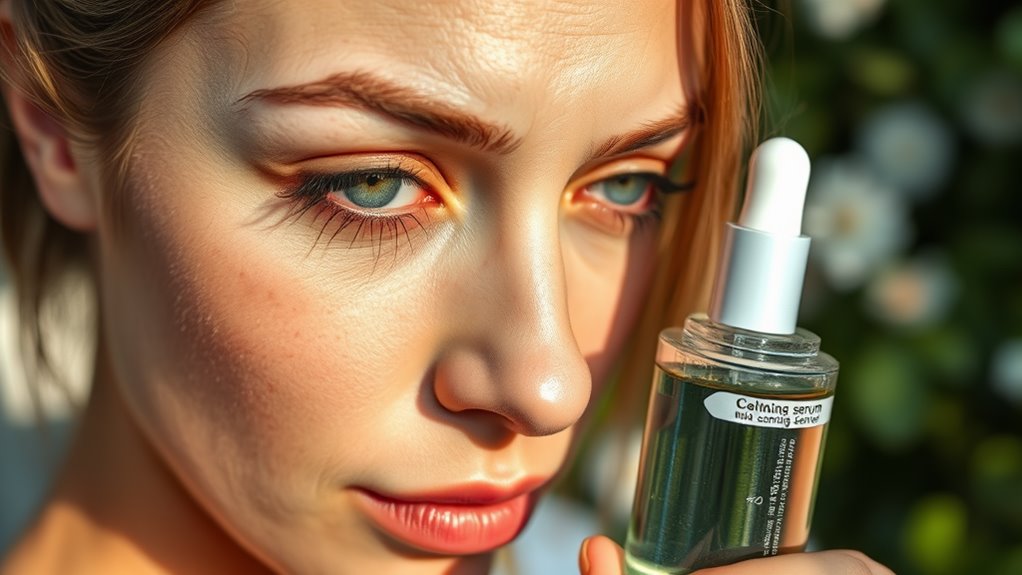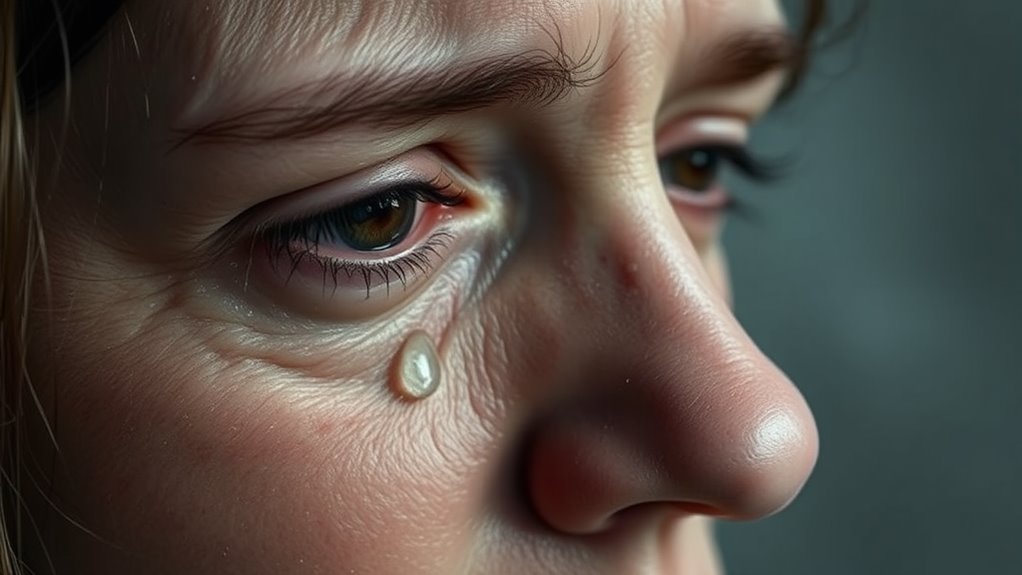How Stress Secretly Wrecks Your Skin – And How to Calm It Down
Stress secretly wrecks your skin by increasing cortisol levels, which boosts oil production and leads to clogged pores. This can trigger acne, worsen eczema, and accelerate the aging process through reduced collagen. Inflammation and hormonal imbalances further impact your skin’s appearance. To calm your skin, incorporate stress management techniques like mindfulness and regular exercise, stay hydrated, and maintain a consistent skincare routine. Discover effective strategies to nurture your skin and enhance your overall well-being.
Key Takeaways
- Stress increases cortisol levels, leading to excess oil production, clogged pores, and acne breakouts on the skin.
- Inflammation from stress can exacerbate conditions like eczema and psoriasis, causing itchy and dry patches.
- Poor sleep and disrupted hydration from stress contribute to dullness and premature aging of the skin.
- Regular exercise and mindfulness practices help lower stress levels, improving skin circulation and overall health.
- Incorporating gentle skincare routines, including hydration and moisturization, can soothe stressed skin and enhance its appearance.
The Connection Between Stress and Skin Health
When you experience stress, your body undergoes a series of physiological changes that can significantly impact your skin health. Elevated cortisol levels, a common response to stress, can lead to increased oil production, resulting in clogged pores and subsequent skin problems.
Furthermore, stress may trigger inflammation, exacerbating conditions like eczema and psoriasis. Your immune response can also weaken, making your skin more susceptible to infections and irritants.
Additionally, stress disrupts the skin’s barrier function, leading to moisture loss and increased sensitivity. Understanding the intricate connection between stress and skin health is crucial for developing effective strategies to mitigate these adverse effects. Managing stress levels can be an essential part of promoting healthier skin.
Common Skin Issues Caused by Stress
Stress can manifest in various skin issues, each stemming from the physiological changes it triggers in your body.
When your body perceives stress, it releases hormones that can disrupt your skin’s balance, leading to specific problems. Here are three common skin issues you may encounter:
-
Acne: Increased oil production and inflammation can lead to breakouts, making your skin appear dull and problematic.
-
Eczema: Stress can exacerbate eczema, causing flare-ups that result in dry, itchy patches.
-
Psoriasis: Stress can trigger or worsen psoriasis symptoms, leading to red, scaly patches on the skin.
Recognizing these issues can empower you to implement effective stress management strategies to protect your skin’s health. Additionally, emotional and physical stress can significantly impact your skin health, leading to these reactions.
The Science Behind Stress-Induced Skin Changes
When you’re stressed, your body releases hormones like cortisol, which can disrupt your skin’s balance. This hormonal imbalance often triggers inflammation, leading to various skin issues such as acne or eczema. Understanding these mechanisms is crucial for managing stress-related skin changes effectively. Additionally, certain habits that worsen acne can compound these effects, making it essential to address both stress and skincare routines.
Hormonal Imbalances Explained
Although you may not immediately connect stress to your skin’s appearance, hormonal imbalances triggered by stress can play a significant role in altering your complexion.
When you’re stressed, your body releases cortisol, which can lead to various skin issues. Understanding these hormonal changes is essential for effective skin care.
-
Increased Oil Production: Elevated cortisol levels stimulate oil glands, leading to clogged pores and acne.
-
Altered Blood Flow: Stress can divert blood flow away from your skin, resulting in a dull and uneven tone.
-
Reduced Collagen Production: Chronic stress hampers collagen synthesis, causing loss of elasticity and premature aging.
Recognizing these hormonal effects allows you to address them strategically, promoting healthier skin.
Inflammation and Skin Health
Hormonal imbalances caused by stress can trigger inflammation, which significantly impacts skin health. Elevated cortisol levels can lead to increased oil production, clogging pores and causing breakouts.
Concurrently, inflammation disrupts the skin barrier, making it more susceptible to irritants and pathogens. This compromised barrier can result in conditions like eczema and psoriasis, exacerbating discomfort and redness.
Additionally, chronic inflammation may accelerate the aging process, contributing to fine lines and loss of elasticity.
To mitigate these effects, focus on stress management techniques, such as mindfulness, exercise, and proper nutrition. Incorporating anti-inflammatory ingredients into your skincare routine can also help restore balance, promoting a healthier complexion and enhancing overall skin resilience against stress-induced changes.
Recognizing the Signs of Stress on Your Skin
When stress impacts your body, your skin often shows the effects first.
You might notice breakouts and blemishes, as well as an overall dullness and dryness.
Recognizing these signs can help you address the root causes of stress before they escalate. Additionally, dietary choices can also play a significant role in exacerbating stress-related skin issues.
Breakouts and Blemishes
Stress can trigger a variety of skin issues, with breakouts and blemishes being among the most noticeable signs.
When you’re under pressure, your body releases cortisol, leading to excess oil production and clogged pores. Recognizing these signs is crucial to managing your skin’s response effectively.
Here are three key indicators of stress-induced breakouts:
-
Increased Acne: You may notice more frequent or severe acne flare-ups, particularly in areas where oil glands are concentrated.
-
Redness and Inflammation: Stress often exacerbates inflammation, resulting in red, swollen pimples that are painful.
-
Delayed Healing: Stress can slow down your skin’s natural healing processes, prolonging the life of blemishes.
Dullness and Dryness
Many people experience noticeable dullness and dryness in their skin during periods of heightened stress. This occurs due to the body’s stress response, which can lead to decreased blood circulation and reduced hydration levels.
When cortisol, the primary stress hormone, increases, it can disrupt your skin’s natural barrier, resulting in transepidermal water loss. You might observe a lackluster complexion, rough texture, and an overall sense of tightness.
To combat these signs, prioritize hydration through both topical moisturizers and adequate water intake. Incorporating antioxidants and humectants into your skincare routine can help restore brightness and moisture.
Regularly managing stress through techniques like mindfulness or exercise can also significantly improve your skin’s appearance. Recognizing these signs empowers you to take proactive measures for healthier skin.
Effective Stress Management Techniques
Although you may feel overwhelmed by daily pressures, implementing effective stress management techniques can significantly enhance both your mental well-being and skin health.
Here are three proven strategies to help you regain control:
-
Mindfulness Meditation: Practicing mindfulness can reduce cortisol levels, promoting relaxation and improving skin conditions exacerbated by stress.
-
Regular Exercise: Engaging in physical activity releases endorphins, which boost your mood and improve circulation, delivering vital nutrients to your skin.
-
Structured Time Management: Prioritizing tasks and setting realistic goals can help reduce feelings of being overwhelmed, allowing more time for self-care and relaxation. Additionally, incorporating soothing ingredients into your skincare routine can further help to calm stressed skin.
Skincare Tips for Stress Relief
When you prioritize skincare as part of your stress relief routine, you’ll not only enhance your complexion but also promote a sense of calm. Implementing effective skincare practices can mitigate stress-related skin issues. Here’s a quick guide:
| Skincare Practice | Benefits |
|---|---|
| Hydration | Maintains skin elasticity and glow |
| Gentle Cleansing | Reduces irritation and breakouts |
| Moisturizing | Locks in hydration and soothes |
| SPF Protection | Prevents damage from stress-induced aging |
| Regular Exfoliation | Removes dead skin, revealing freshness |
Incorporate these techniques into your daily regimen. Consistency is key; you’ll observe improvements in your skin and overall well-being. Mastering your skincare routine can be a powerful ally against stress.
Establishing a Relaxation Routine for Healthy Skin
Creating a relaxation routine is essential for maintaining healthy skin, as stress can significantly impact your complexion. To effectively combat stress and enhance your skin’s vitality, consider implementing these three strategies:
-
Mindful Breathing: Dedicate 5-10 minutes daily to focused breathing exercises. This practice lowers cortisol levels, promoting skin regeneration.
-
Consistent Sleep Schedule: Prioritize 7-9 hours of quality sleep each night. Adequate sleep fosters cellular repair, enhancing skin elasticity and radiance.
-
Regular Physical Activity: Engage in at least 30 minutes of moderate exercise most days. Physical activity boosts circulation, delivering nutrients to your skin while reducing stress hormones.
Incorporating these elements into your routine won’t only alleviate stress but also contribute to a healthier, more vibrant complexion.




